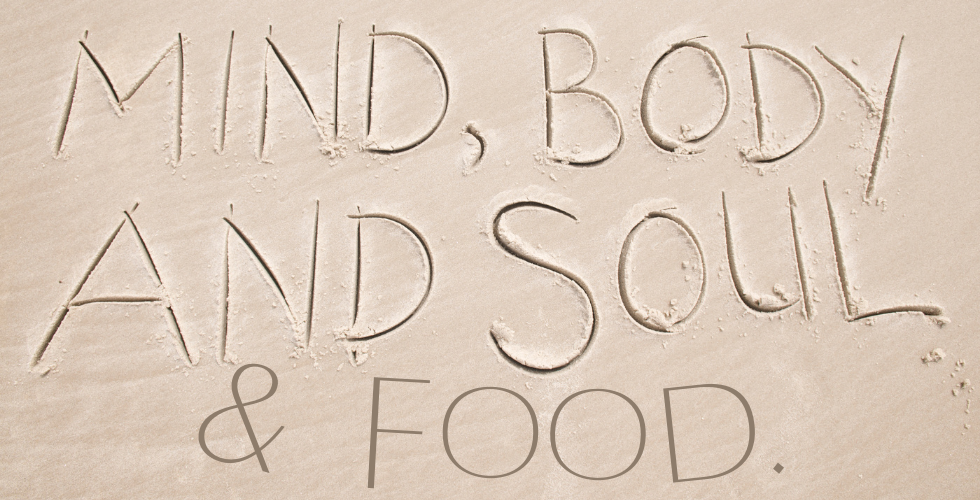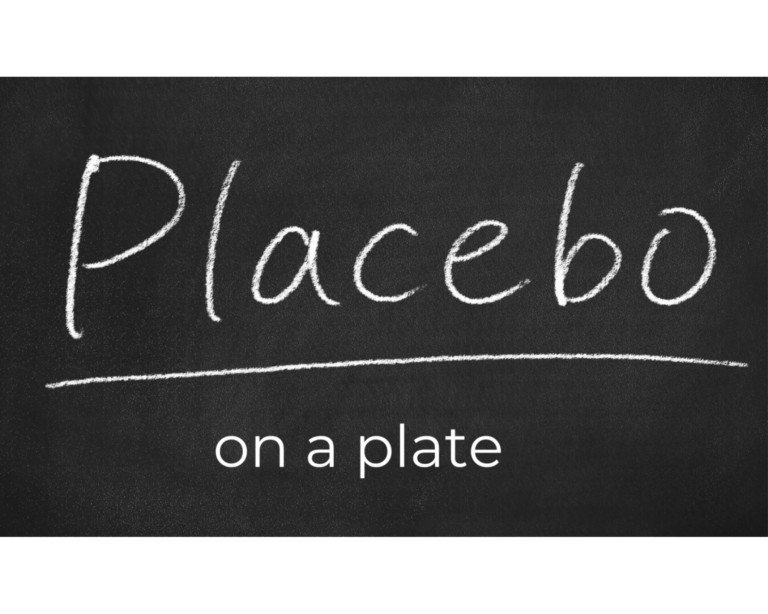
Mind over Food
Our relationship with food is the sum total of our innermost thoughts and feelings about what we eat. This relationship with food is as deep and revealing as any we might ever have. How each of us thinks about eating is so profoundly relative that if a group of us were looking at the same plate of food, no two people would see the same thing, or metabolise it the same way.
Imagine we were examining a plate of pasta, chicken, and salad.
– A woman wanting to lose weight might see calories and fat. She’d respond favourably to the salad or chicken but might view the pasta with fear.
– A body builder trying to gain muscle mass might look at the same meal and see protein. She’d focus on the chicken and look past the other foods.
– A vegetarian could see the sight of a dead animal and wouldn’t touch anything on the plate.
– A chicken farmer, on the other hand, would likely be proud to see a good piece of meat.
– Someone trying to heal a disease through diet could see either potential medicine or potential poison, depending on whether or not the plate of food is permissible on her healing diet.
Amazingly, each of these people will metabolise this same meal quite differently in response to their unique thoughts. What we think and feel about a food can be as important when it comes to nutritional value and its effect on the body.
How Your Brain Eats
The information ‘highway’ of the brain, spinal cord, and nerves is a complex system through which your mind communicates with your digestive organs. This Mind Body connection plays a huge part in eating psychology.
Let’s say you’re about to eat an ice cream. The notion and image of that ice cream creates a whole myriad of responses throughout the body and brain. The system signals emotions and key physiological functions such as hunger, thirst, temperature, sex drive, heart rate, and blood pressure. There is so much activity in the mind and biology of the body.

If the ice cream is your favourite flavour – and you consume it with delight, the brain will modulate this positive input by sending activation signals via parasympathetic system response, stomach, intestines, pancreas, liver, and gallbladder. Digestion will be stimulated and you’ll have a full metabolic breakdown of the ice cream while burning its energy (calories) more efficiently.
A great example of this activity is when you smell or see one of your favourite foods, your mouth starts to water. The cephalic phase of digestion, (cephalic literally means the head) sets off metabolism via, taste, aroma, texture, pleasure. (more on this in another blog).
In other words, the body takes sensory, emotional, and thought input and transduces this information into physiological responses. This is nothing short of a miracle.
…and wonderful news for us! Have a different thought and watch what happens.
Likewise, If you’re feeling guilty about eating the ice cream or judging yourself for eating it, your brain will take this negative input and send signals via sympathetic nervous system response. This initiates inhibitory responses in the digestive organs, which means you’ll be eating your ice cream but not fully metabolising it. It may stay in your digestive system longer, which can diminish your population of healthy gut bacteria and increase the release of toxic by-products into the bloodstream.
Furthermore, inhibitory signals in the nervous system can decrease your calorie-burning efficiency via increased insulin and cortisol, which would cause you to store more of your guilt-infused ice cream as body fat.
So the thoughts you have about the food you eat instantly become reality in your body via the central nervous system.
The brain doesn’t distinguish between a real stressor or an imagined one. If you sat in a room all by yourself, happy and content, and started thinking about the guy who did you wrong years ago, and if that story still carries a charge for you – your body would quickly shift into physiologic stress-state – increased heart rate and blood pressure, followed by decreased digestive function.
Guilt about food, shame about the body, or judgement about health are considered stressors by the brain. You could eat the healthiest meal on the planet, but if you’re thinking toxic thoughts, the quality of digestion decreases and your fat storage increases, just the same as if a lion is approaching. Likewise, you could be eating a nutritionally challenged meal, but if your head and heart are in the right place, the nutritional power of your food will be increased.

The power of the mind was perfectly demonstrated in this study where medical researchers were testing a new chemotherapy treatment.
One group of cancer patients received the actual drug being tested while another group received a placebo.
In the course of this study, no one thought twice when 74 percent of the cancer patients receiving the real chemotherapy exhibited one of the more common side effects of this treatment: they lost their hair.
Yet, quite remarkably, 31 percent of the patients on the placebo chemotherapy – a saltwater injection – lost their hair too.
Such is the power of expectation. The only reason that those placebo patients lost their hair is because they believed they would. Like many people, they associated chemotherapy with going bald.
So if the power of the mind is strong enough to make our hair fall out when taking a placebo, what do you think happens when we think to ourselves “This cake is fattening,” or “I’m going to eat this fried chicken even if it’ll make me fat’’.
It’s not that we can eat poison without any harm if we believe it’s good for us, but what we believe about any substance we consume can powerfully influence how it affects the body.

Every day, millions of people eat and drink while thinking strong and convincing thoughts about their meal.
Consider some of the foods we have given strong associations to:
“Salt will raise my blood pressure.”
“Fat in food is fat on my body.”
“Sugar will rot my teeth.”
“I can’t make it through the day without my cup of coffee.”
“This beef will raise my cholesterol level.”
“This calcium will build my bones.”
To a certain degree, some of these statements may be true. But is it possible that we are instigating these effects? And if these effects are the result of eating these foods, you see how we can affect those results with our own expectations?
Research has shown that a high percentage of prescription drugs may owe their effectiveness to placebo power and that over-the-counter medications, such as headache remedies, cough medicines, and appetite suppressants, are placebo based. In some studies the response to placebos is as high as 90 percent.
It seems that very few in the scientific community have made the obvious connection between placebo power and food. There is no doubt that the placebo effect is built into the nutritional process.
It’s time to bring your happier and more relaxed self to the table!


